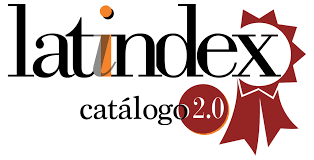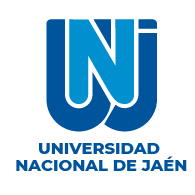Improvement plans and their influence on learning indicators in engineering education
DOI:
https://doi.org/10.37787/17qt2w30Keywords:
indicadores de aprendizaje, plan de mejora, evaluaciónAbstract
The purpose of this research was to analyse the influence of the improvement plans on the learning indicators measured in the subjects Electropneumatic Automation and Transformers and Transmission Lines taught in the professional career of Mechanical and Electrical Engineering at the National University of Jaén, Cajamarca, Peru. The improvement plans are aimed at strengthening the quality of the teaching-learning process and were implemented starting in 2020. The measurement and evaluation of learning was carried out according to the following stages: definition of the educational objectives of the programme, construction of the matrix of the contribution of the subjects in the learning indicators, selection of the subjects and elaboration and implementation of the improvement plans. The learning indicators obtained from the implementation of the improvement plans were processed following the established guidelines for an analysis of variance and Tukey's multiple comparisons test, obtaining evidence that indicates the existence of highly significant differences when comparing semesters and learning indicators with respect to the percentage of the level of achievement reached, which reflects the influence of the improvement plans that acquire a continuous character when applied semester after semester
References
Ahmed, S. (2017). Teaching and assessing lifelong learning in laboratory courses. Proceedings of the Canadian Engineering Education Association (CEEA). https://doi.org/10.24908/pceea.v0i0.10140
Chávez Quiroga, L. G., Madrid Alamo, A. Y., Quinde Li Say Tan, J. I., y Zapata Ojeda, M. D. (2018). Proceso de Assessment para la Facultad de Ingeniería basado en el Modelo de Acreditación ICACIT. Proceedings of the 16th LACCEI International Multi-Conference for Engineering, Education, and Technology: “Innovation in Education and Inclusion”. The 16th LACCEI International Multi-Conference for Engineering, Education, and Technology: “Innovation in Education and Inclusion”. https://doi.org/10.18687/LACCEI2018.1.1.270
Coello, J. G., y Huggins, K. (2019). The Students Outcomes ABET (1-7) and SOLO’s Taxonomy: An Approach. Proceedings of the 5th International Conference on Frontiers of Educational Technologies, 110-117. https://doi.org/10.1145/3338188.3338212
Cruz, M. L., Saunders-Smits ,Gillian N., y and Groen, P. (2020). Evaluation of competency methods in engineering education: A systematic review. European Journal of Engineering Education, 45(5), 729-757. https://doi.org/10.1080/03043797.2019.1671810
Gabalán-Coello, J., y Huggins, K. (2018). Desarrollo de una metodología para la medición de los Student Outcomes (1-7) de ABET empleando taxonomía SOLO. Proceedings of the 16th LACCEI International Multi-Conference for Engineering, Education, and Technology: “Innovation in Education and Inclusion”. The 16th LACCEI International Multi-Conference for Engineering, Education, and Technology: “Innovation in Education and Inclusion”. https://doi.org/10.18687/LACCEI2018.1.1.63
Hawe, E. M., y Dixon, H. R. (2014). Building students’ evaluative and productive expertise in the writing classroom. Assessing Writing, 19, 66-79. https://doi.org/10.1016/j.asw.2013.11.004
Ibidunni, A. S., Nwaodu, B. Y., y Mdaka, L. E. (2023). Bringing quality management to perspective in higher education institutions’ research output: A focus on selected private universities in Nigeria. Heliyon, 9(4). https://doi.org/10.1016/j.heliyon.2023.e15443
Mahajan, R., y Bansal, D. (2023). Designing Performance Metrics and Rubrics to Assess Student Outcome Attainment in Engineering Project Design Course. Journal of Education, 203(2), 459-467. https://doi.org/10.1177/00220574211032587
Mustaffa, N. A., Zulkifliand, M., y Murat, I. Z. (2019). Measuring Course Learning Outcome for Large Class of Introductory Statistics Course. 8(7).
Parejo, N. F. H., y Araujo, C. C. de. (2022). Evaluación de los aprendizajes por competencias: Una mirada teórica desde el contexto colombiano. Revista de Ciencias Sociales (Ve), XXVIII(1), 106-122.
Quiroga, G. C., Alamo, A. M., Tan, J. Q. L. S., López, C. W., y Ojeda, M. Z. (2019). Assessment and Evaluation of the Student Outcomes and Formulation of Improvement Plans for an Engineering Academic Program. 2019 International Symposium on Engineering Accreditation and Education (ICACIT), 1-8. https://doi.org/10.1109/ICACIT46824.2019.9130356
Sadler, D. R. (1989). Formative assessment and the design of instructional systems. Instructional Science, 18(2), 119-144. https://doi.org/10.1007/BF00117714
Tai, J., Ajjawi, R., Boud, D., Dawson, P., y Panadero, E. (2018). Developing evaluative judgement: Enabling students to make decisions about the quality of work. Higher Education, 76(3), 467-481. https://doi.org/10.1007/s10734-017-0220-3
Titova, O., Luzan, P., Davlatzoda, Q. Q., Mosia, I., y Kabysh, M. (2023). The Taxonomy Approach for Engineering Students’ Outcomes Assessment. En V. Tonkonogyi, V. Ivanov, J. Trojanowska, G. Oborskyi, y I. Pavlenko (Eds.), Advanced Manufacturing Processes IV (pp. 380-390). Springer International Publishing. https://doi.org/10.1007/978-3-031-16651-8_36
Wyatt-Smith, C., y Adie, L. (2021). The development of students’ evaluative expertise: Enabling conditions for integrating criteria into pedagogic practice. Journal of Curriculum Studies, 53(4), 399-419. https://doi.org/10.1080/00220272.2019.1624831
Published
Issue
Section
License
Copyright (c) 2025 Pakamuros Scientific Journal

This work is licensed under a Creative Commons Attribution-NonCommercial 4.0 International License.













